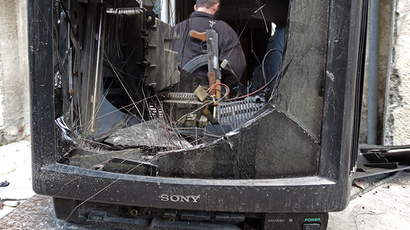‘Second ISIS’ made up of defeated rebels is emerging in Syria – former Al-Nusra prisoner to RT
Rebels from various parts of Syria are flocking to the country’s northwestern corner, giving rise to a “second Islamic State,” a US journalist and former Al-Nusra captive told RT, warning that the West is blind to what’s happening on the ground.
Western media coverage of the Syrian crisis is inadequate and biased, while most things reported about Aleppo are false or unprovable, a US journalist and former Al-Nusra captive told RT, while noting that the rise of a “second Islamic State [IS, formerly ISIS/ISIL]” is being completely overlooked.
Peter Theo Curtis, an American journalist who is known by his pen name Theo Padnos, was asked to share his view on how the war in Syria is seen in the West. Abducted by Al-Qaeda affiliated Al-Nusra Front in 2012 while trying to sneak into rebel-controlled Syrian territory, he gained insight into the various armed factions fighting the government, from the “moderate” Free Syrian Army to hardcore Islamists.
“I think that the Western understanding of what is happening in Syria is inadequate,” Padnos told RT.
“They don’t know what’s happening on the ground, they either don’t understand the language, or they can’t make sense of the videos, or their informants are, perhaps, biased,” he said.
Many in the West hardly understand “who the important forces are, what they want, and where they are,” Padnos said.
READ MORE: Journalist who returned from Islamic State HQ tells RT how jihadists can be defeated
“I think most of the things that we in the West say about Aleppo are either false or improvable [sic], or just irrelevant,” he said, adding that some critical details about the Syrian conflict are underreported or simply go unnoticed.
“Something very dangerous and alarming is occurring in northwestern Syria, and this is the emergence of the second Islamic State there,” he stressed.
Asked how concerning this development is, Padnos responded by saying “we will know it when they turn up in Paris or London with Kalashnikovs.”
The new terrorist grouping possesses “tons of weapons,” he warned, noting that it includes rebels defeated by the Syrian army in Aleppo, Homs, Daraa, and the outskirts of Damascus who were “shipped up to the northwestern Syria.”
They are particularly active in the province of Idlib “governing itself by Sharia law which involves shooting people on the street. As somebody who has been tried in an Islamic court up there, I know what it’s like. It’s not exactly justice; it’s not democracy; it’s not what we want; it’s not exactly justice; it’s not what we want for our fellow human beings,” he told RT, stressing “we should pity the women and the children up there.”
“It could carry on forever unless the outside world can really stop sending missiles to the rebels,” the journalist warned.
Padnos – a one-of-a-kind character who is a fluent Arabic speaker – went to Yemen in the mid-2000s and enrolled in a religious school popular among Muslims dreaming of the return of the initial version of Islam. He later wrote in the New York Times that “I was eager to understand a world where the West often seemed to lose its way,” a desire that inspired him to go to war-torn Syria in 2012.
However, before he made it, he was abducted by Al-Nusra Front, a Syrian rebel group with ties to Al-Qaeda, and held in a number of prisons. According to Curtis, the Islamists tortured and humiliated him, while pushing him to convert to Islam from time to time with no result.
His family received numerous requests for a ransom of between $3 million and $25 million, but his release was finally engineered in 2014 by the Qatari secret service. According to a statement from his family, Curtis was freed “on a humanitarian basis without the payment of money.”
Speaking on the subject to Business insider earlier, Curtis specifically pointed out that a “second Islamic State” is operating in close proximity to Europe’s borders.
“It’s right on the Turkish border,” he explained.
“To get to this second Islamic State from any European country, it’s a couple of days on the bus. Young kids are going every day, that’s what the guys on the ground in Syria are telling me: ‘Oh yes, we have new French people, new English people every day,’” he said.













